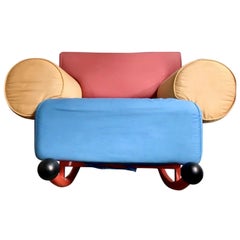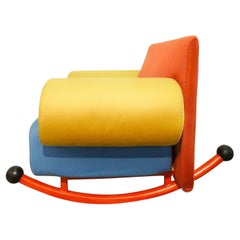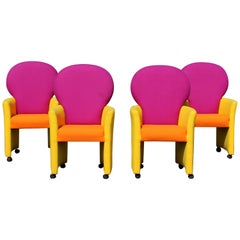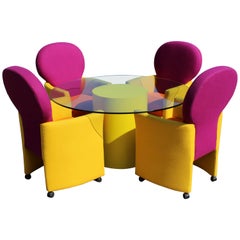Milo Baughman Prisma
Late 20th Century American Post-Modern Rocking Chairs
Steel
Late 20th Century American Post-Modern Rocking Chairs
Steel
Recent Sales
Vintage 1970s American Mid-Century Modern Armchairs
Vintage 1970s American Mid-Century Modern Dining Room Sets
Vintage 1980s American Post-Modern Armchairs
Metal
People Also Browsed
Vintage 1970s Italian Mid-Century Modern Sofas
Bouclé
Vintage 1980s Italian Memphis Group Armchairs
Steel
Vintage 1970s Italian Chandeliers and Pendants
Brass
Early 2000s North American Daybeds
Fabric
21st Century and Contemporary Vietnamese Minimalist Side Tables
Wood
Vintage 1980s Italian Post-Modern Chairs
Steel
Vintage 1970s Italian Modern Sideboards
Wood
Late 20th Century Unknown Post-Modern Desks and Writing Tables
Metal, Steel, Chrome
Vintage 1960s Scandinavian Mid-Century Modern Wall Lights and Sconces
Metal
Vintage 1980s Japanese Post-Modern Ceramics
Porcelain
Late 20th Century Post-Modern Wall Clocks
Glass, Plastic
2010s Italian Mid-Century Modern Desks and Writing Tables
Plywood, Lacquer
1990s Post-Modern Coat Racks and Stands
Steel
21st Century and Contemporary French Art Deco Chandeliers and Pendants
Bronze
1990s Coffee and Cocktail Tables
Aluminum
Late 20th Century Italian Post-Modern Tea Sets
Ceramic
Milo Baughman for sale on 1stDibs
Milo Baughman was one of the most agile and adept modern American furniture designers of the late 20th century. A prolific lecturer and writer on the benefits of good design — he taught for years at Brigham Young University — Baughman (whose often-scrambled surname is pronounced BAWF-man) focused almost exclusively on residential furnishings, such as chairs, sofas and benches. He had a particular talent for lounge chairs, perhaps the most sociable piece of furniture.
Like his fellow adoptive Californians Charles and Ray Eames, Baughman’s furniture has a relaxed and breezy air. He was famously opposed to ostentatious and idiosyncratic designs that were made to excite attention. While many of his chair designs are enlivened by such effects as tufted upholstery, Baughman tended to let his materials carry the aesthetic weight, most often relying on seating and table frames made of sturdy and sleek flat-bar chromed metal, and chairs, tables and cabinets finished with highly-figured wood veneers.
Like his colleagues Karl Springer and the multifarious Pierre Cardin, Baughman’s designs are emblematic of the 1970s: sleek, sure and scintillating.
As you will see from the furniture presented on 1stDibs, Milo Baughman’s designs for the likes of Drexel Furniture, Glenn of California and — for five decades — Thayer Coggin are ably employed as either the heart of a décor or its focal point.
Finding the Right Armchairs for You
Armchairs have run the gamut from prestige to ease and everything in between, and everyone has an antique or vintage armchair that they love.
Long before industrial mass production democratized seating, armchairs conveyed status and power.
In ancient Egypt, the commoners took stools, while in early Greece, ceremonial chairs of carved marble were designated for nobility. But the high-backed early thrones of yore, elevated and ornate, were merely grandiose iterations of today’s armchairs.
Modern-day armchairs, built with functionality and comfort in mind, are now central to tasks throughout your home. Formal dining armchairs support your guests at a table for a cheery feast, a good drafting chair with a deep seat is parked in front of an easel where you create art and, elsewhere, an ergonomic wonder of sorts positions you at the desk for your 9 to 5.
When placed under just the right lamp where you can lounge comfortably, both elbows resting on the padded supports on each side of you, an upholstered armchair — or a rattan armchair for your light-suffused sunroom — can be the sanctuary where you’ll read for hours.
If you’re in the mood for company, your velvet chesterfield armchair is a place to relax and be part of the conversation that swirls around you. Maybe the dialogue is about the beloved Papa Bear chair, a mid-century modern masterpiece from Danish carpenter and furniture maker Hans Wegner, and the wingback’s strong association with the concept of cozying up by the fireplace, which we can trace back to its origins in 1600s-era England, when the seat’s distinctive arm protrusions protected the sitter from the heat of the period’s large fireplaces.
If the fireside armchair chat involves spirited comparisons, your companions will likely probe the merits of antique and vintage armchairs such as Queen Anne armchairs, Victorian armchairs or even Louis XVI armchairs, as well as the pros and cons of restoration versus conservation.
Everyone seems to have a favorite armchair and most people will be all too willing to talk about their beloved design. Whether that’s the unique Favela chair by Brazilian sibling furniture designers Fernando and Humberto Campana, who repurposed everyday objects to provocative effect; or Marcel Breuer’s futuristic tubular metal Wassily lounge chair; the functionality-first LC series from Charlotte Perriand, Le Corbusier and Pierre Jeanneret; or the Eames lounge chair of the mid-1950s created by Charles and Ray Eames, there is an iconic armchair for everyone and every purpose. Find yours on 1stDibs right now.



